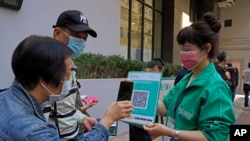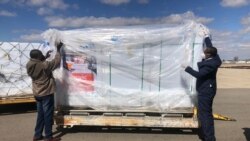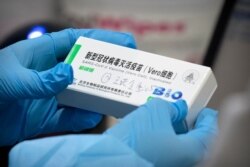As the coronavirus pandemic continues its deadly sweep around the globe, health officials are racing to get as many vaccines into arms as possible. This report looks at those made in China.
Chinese companies Sinovac and Sinopharm are leading Chinese vaccine makers, and both have been approved by the World Health Organization for use against COVID-19.
Sinovac is a privately owned company while Sinopharm is government run. Chinese scientists use the same method to make both vaccines.
Dr. Andrea Cox is a professor at the Johns Hopkins School of Medicine. She says for vaccines like these, scientists take a virus or bacterium, inactivate or kill it, and inject it into people. Because the virus is dead, it can’t infect anyone. Then, if a vaccinated person is exposed to the live virus, their body recognizes it and fights it off. But, Cox says, there’s a downside.
“The problem is that these inactivated vaccines are eliciting a different and slightly less effective type of immune response.... The Sinovac vaccine has been tested and has shown to be variably protective, but not quite as effective as some others out there," said Cox.
The World Health Organization says the Sinovac vaccine is about 50% effective. Sinovac says the vaccine significantly reduces the severity of a COVID-19 infection.
Sinopharm’s effectiveness is higher. The WHO reported it was 78% effective.
Two doses are needed for both vaccines. To make them more effective, vaccines are often mixed with an adjuvant, a harmless ingredient like aluminum salts or a bubble of fat. On its web site, the U.S. Centers for Disease Control and Prevention says, “Aluminum is one of the most common metals found in nature and is present in air, food, and water,” so it’s not a foreign or dangerous ingredient, although anti-vax groups claim it is. For example, Sinovac uses aluminum hydroxide, an ingredient also used to treat an upset stomach.
The Sinovac and Sinopharm vaccines have a major advantage over other COVID vaccines. They are easy to store and only need normal refrigeration. Until more effective vaccines are available, that is a huge plus in getting a COVID vaccine to people in remote areas. Again, Dr. Cox.
“In an ideal world, we wouldn’t need them, but at this point, we need a way to get the world vaccinated as rapidly and effectively as possible and it may require a use of vaccines that we know are not as good but are but are better than not being vaccinated," said Cox.
The World Health Organization says safe and effective vaccines are a game-changing tool, but for now and the foreseeable future, the WHO recommends continued mask-wearing, frequent hand cleaning, good ventilation indoors, practicing physical distancing and avoiding crowds. And, above all, getting vaccinated against COVID-19 when you can with what ever vaccine is available.
Cox says we are lucky to have so many governments investing in the vaccines and so many top scientists working on making them.
“Having the world’s best scientists, and I do really mean the world’s best scientists, thinking about how to make effective vaccines and deliver them to a global population is critical," said Cox. "And the more data we get on these vaccines, the more we will be able to select out vaccines that do protect the largest number of the world’s population.”
The WHO says it is not vaccines that will stop the pandemic, it’s vaccination.







